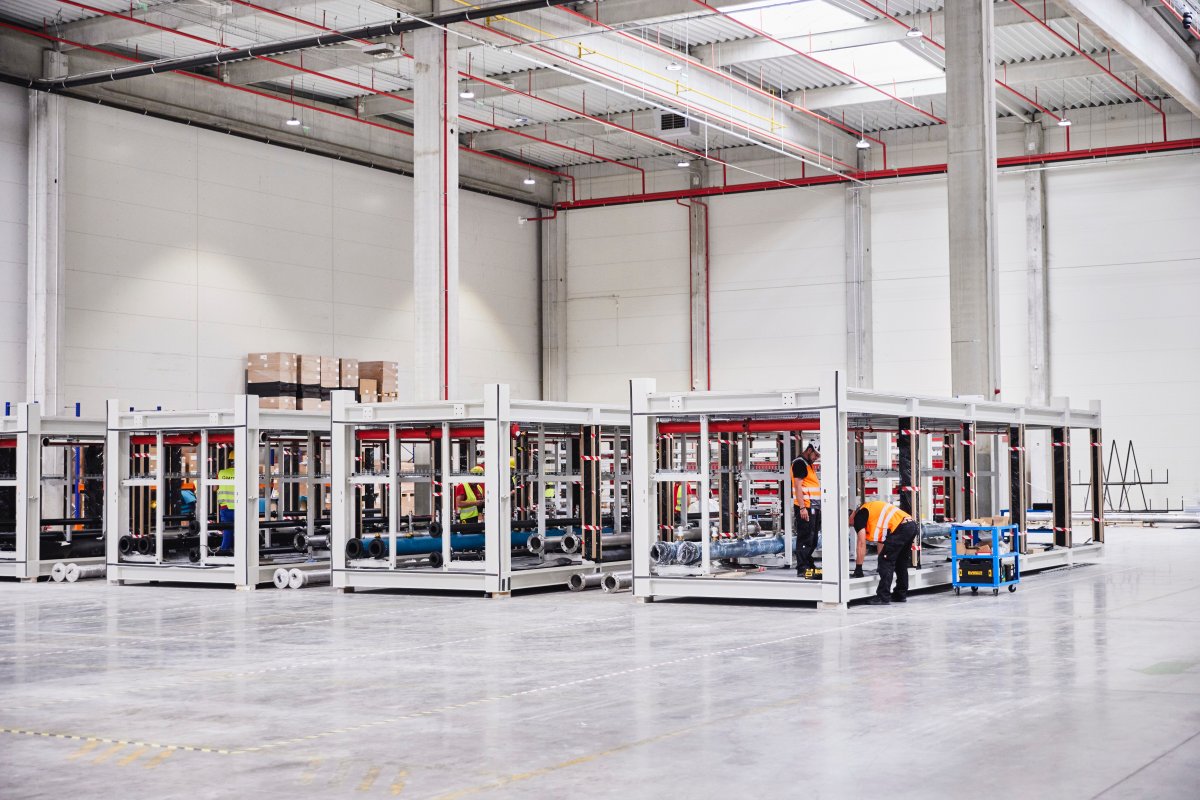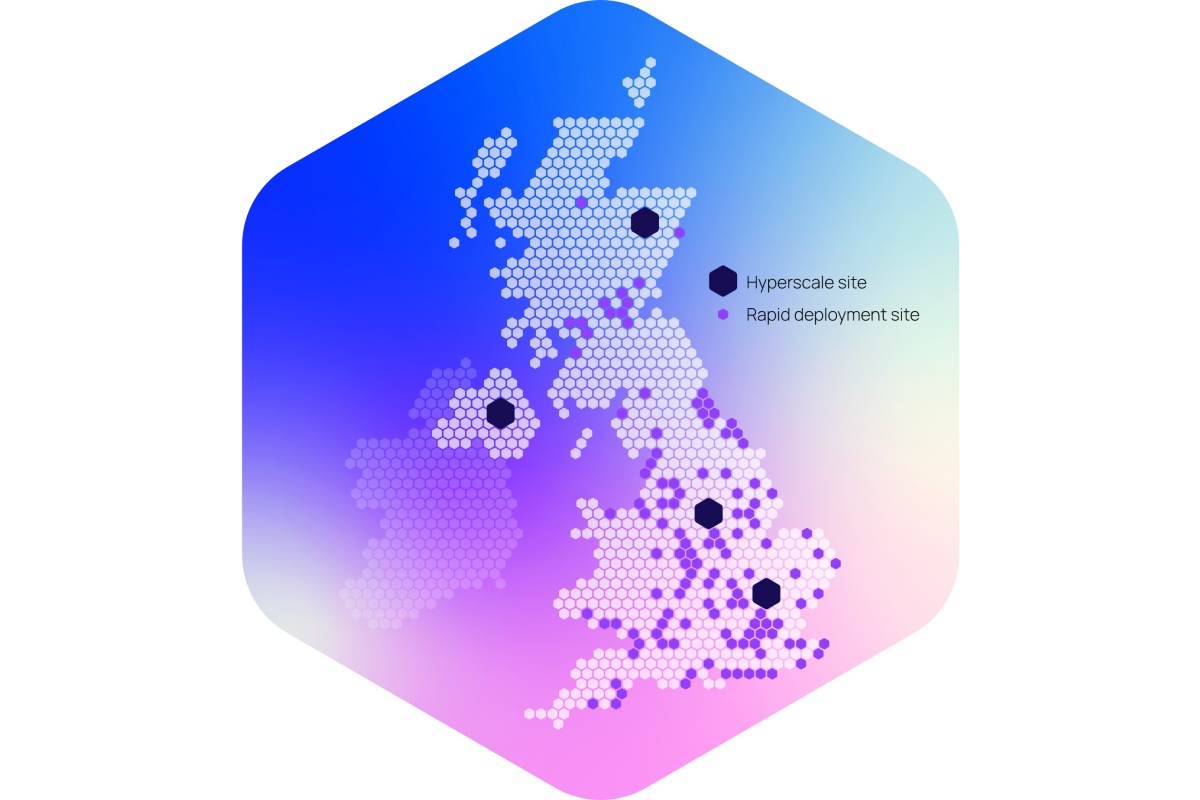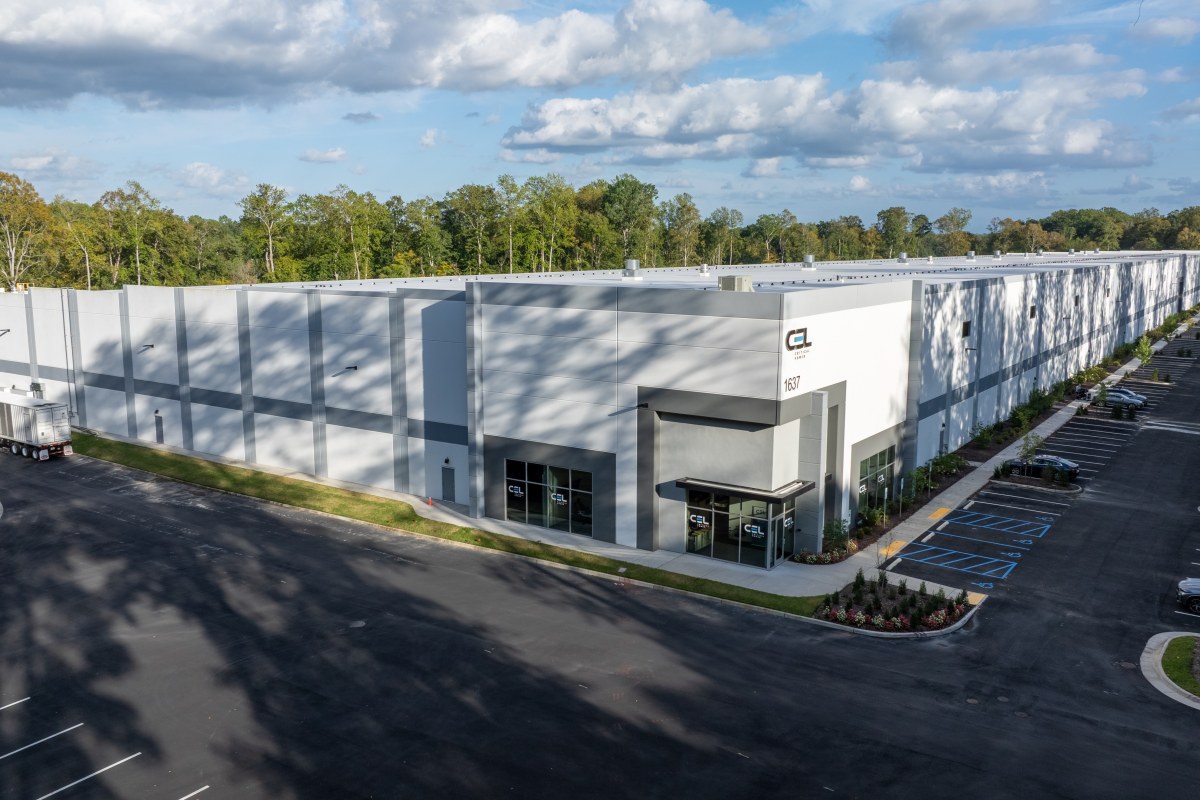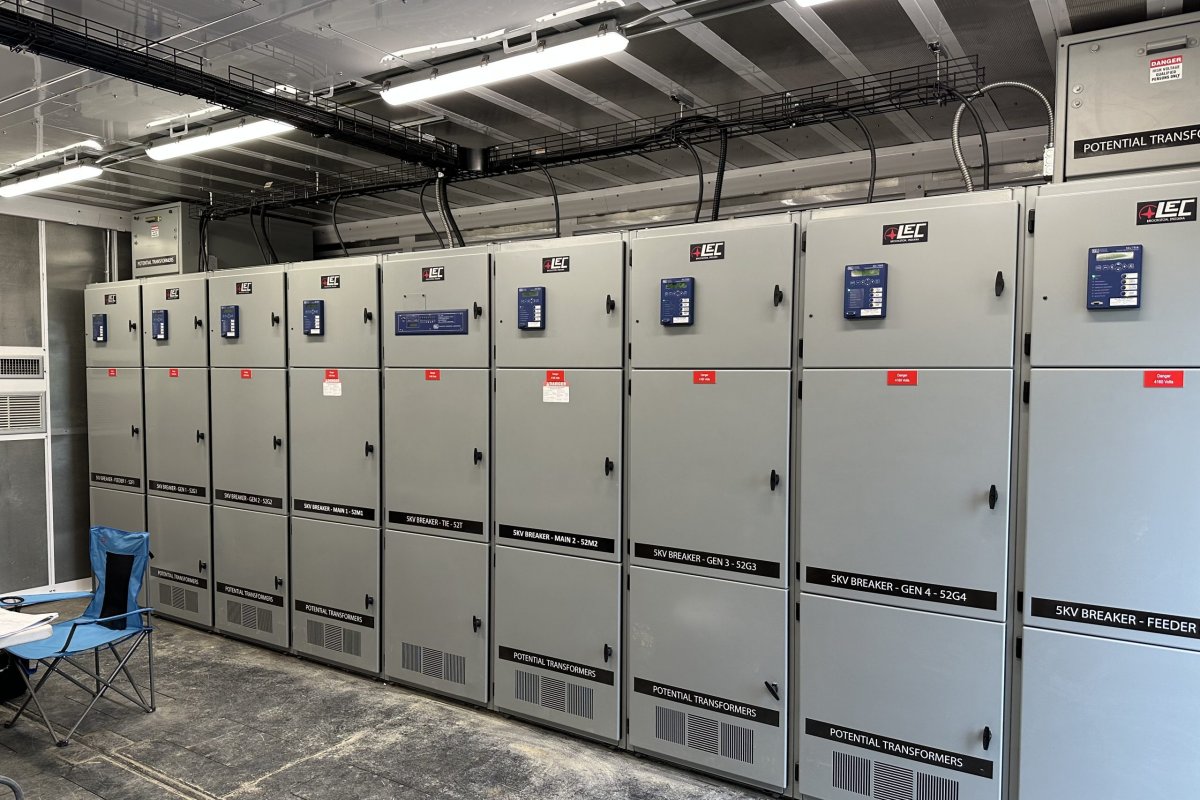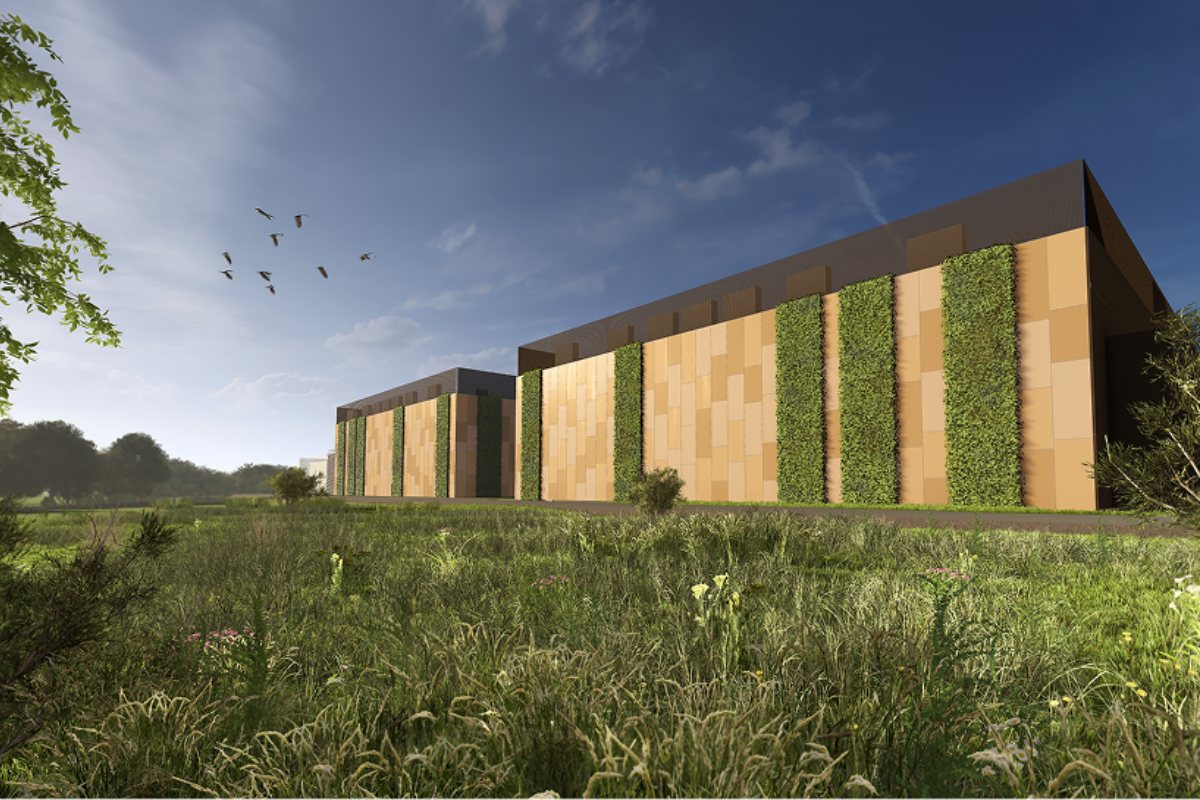Data Centre Business News and Industry Trends
Commercial Real Estate: Property Developments, Trends & Infrastructure
Data Centre Architecture Insights & Best Practices
Data Centre Build News & Insights
Data Centre Business News and Industry Trends
InfraPartners, JLL partner to accelerate AI DC delivery
InfraPartners, a designer and builder of prefabricated AI data centres, and JLL, a global commercial real estate and investment management company, have formed a strategic agreement to accelerate the development and operation of AI data centres.
The partnership brings together InfraPartners’ prefabricated AI data centre designs and JLL’s capabilities in site selection, project management, construction oversight, financial structuring, and facilities management.
The companies state that the combined model is intended to address persistent challenges in data centre development, particularly the period between site identification and operational readiness.
As investment in AI infrastructure grows, operators increasingly require deployment models that offer predictable schedules, reduced risk, and scalable designs suitable for GPU-heavy environments.
Data centre construction continues to face risks associated with labour shortages, schedule delays, and complex financing.
InfraPartners and JLL say they aim to manage these issues jointly by integrating design, prefabrication, delivery, and long-term operations into a single framework.
Prefabrication and integrated delivery for AI infrastructure
“Our clients are asking for faster, lower-risk routes to delivering AI infrastructure,” says Michalis Grigoratos, CEO at InfraPartners. “Our prefabricated, upgradeable digital infrastructure integrates seamlessly with JLL’s expertise across the full project lifecycle, so, together, we’re focused on providing a superior product that keeps pace with AI infrastructure changes and market growth.
"Our globally scalable, repeatable approach includes site selection, prefabrication, and long-term operations, reducing time-to-first-token and maximising performance across the lifecycle.”
Matt Landek, JLL Division President, Data Centers and Critical Environments, adds, “AI infrastructure demands a new approach - one that’s as dynamic and high-performing as the workloads it supports.
“With InfraPartners, we are delivering a unique blueprint that brings real estate, engineering, and operational precision into a unified model.”
Kristen Vosmaer, Managing Director at JLL, oversees global programme management, including JLL White Space and facilities management solutions, and supports delivery of the partnership.
He comments, “This is one of the first collaborations to fully integrate data centre design, manufacturing, construction, commissioning, computer deployment, and lifecycle management for institutional-grade real estate delivery, marking a significant shift in shortening the time to monetisation for how mission-critical infrastructure assets are developed and maintained.”
The companies plan to offer end-to-end capabilities intended to accelerate the delivery of AI-ready facilities for enterprise, government, and cloud operators.
Initial deployment efforts will focus on high-growth AI markets in EMEA and the United States from Q1 2026, with plans to expand into additional regions.
For more from InfraPartners, click here.
Joe Peck - 21 November 2025
Data Centre Business News and Industry Trends
Data Centre Infrastructure News & Trends
Innovations in Data Center Power and Cooling Solutions
Insights into Data Centre Investment & Market Growth
Vertiv, Caterpillar to expand joint energy offerings for AI DCs
Vertiv, a global provider of critical digital infrastructure, and Caterpillar, a manufacturer of construction equipment, have agreed to collaborate on energy optimisation for AI data centres, combining power generation, distribution, and cooling expertise in a set of integrated reference designs.
The aim is to support operators facing rising demand for on-site power and thermal management as AI workloads expand.
The undertaking will connect Vertiv’s power distribution and cooling portfolio with Caterpillar’s and Solar Turbines’ experience in power generation and combined cooling, heat, and power (CCHP).
The companies intend to offer pre-designed architectures intended to streamline deployment and standardise performance across sites.
Integrated approach to power and cooling
Caterpillar and Solar Turbines will provide natural gas turbines and reciprocating engines for scalable on-site power and thermal output for CCHP configurations.
Vertiv will contribute power and cooling technologies packaged as modular, pre-designed blocks to reduce design time and support consistent deployment across facilities.
According to the companies, this approach is intended to shorten deployment time, improve operational efficiency, and offer global lifecycle support through established service networks.
Gio Albertazzi, CEO at Vertiv, comments, “This collaboration with Caterpillar and Solar Turbines is a cornerstone of our 'Bring Your Own Power & Cooling' strategy and aligns seamlessly with our grid-to-chip framework by offering resilient, on-site power generation solutions. This is optimal for customers looking to reduce or eliminate grid dependence.
“By combining our complementary technologies, portfolios, and expertise, we are enabling coordinated integration. Our pre-engineered, interoperability-tested building blocks let customers execute design, build, and deploy concurrently, with predictable system performance.”
Jason Kaiser, Group President of Caterpillar Power & Energy, adds, “As AI-driven workloads continue to accelerate, the demand for robust and scalable power infrastructure and cooling is becoming increasingly critical. Our collaboration with Vertiv will enable us to deliver integrated, on-site energy solutions that lower PUE and meet customers’ evolving needs.”
The companies state that the undertaking will support data centre operators facing energy constraints by helping them deploy AI-ready facilities with improved efficiency and more predictable commissioning.
A Memorandum of Understanding between Vertiv and Caterpillar establishes the framework for further development of this joint ecosystem.
For more from Vertiv, click here.
Joe Peck - 19 November 2025
Data Centre Build News & Insights
Data Centre Business News and Industry Trends
Data Centre Projects: Infrastructure Builds, Innovations & Updates
Insights into Data Centre Investment & Market Growth
Carbon3.ai to invest £1bn in UK’s AI infrastructure network
Carbon3.ai, a UK sovereign AI infrastructure company, has announced a £1 billion commitment to develop a nationwide network of data centres that aims to transform legacy industrial and energy infrastructure into secure, fully sustainable, AI-ready hubs.
Designed, owned, and operated by Carbon3.ai, the network will seek to deliver high-performance, low-carbon compute capacity to fuel the digital readiness of UK enterprise, research, and public services.
All infrastructure and data processing will be located within the UK and fully subject to UK jurisdiction and regulatory oversight.
The company has already completed a successful proof of concept and is moving into full-scale rollout with its first 5MW site in the East Midlands, set to open in March 2026, and planning permission submitted for a second facility in Derbyshire.
New appointments for further expansion
To drive this next phase of growth, Carbon3.ai says it has strengthened its leadership with a team that "brings together deep expertise across government, finance, and national security."
Sana Khareghani, former Head of the UK Government Office for Artificial Intelligence, joins as Chief Strategy Officer, leading the company’s strategy on national AI infrastructure and seeking to ensure its network advances the UK’s digital competitiveness and long-term energy transition.
Sana is supported by advisors Richard Collier-Keywood, former Vice Chair of PwC’s Global Board, and Sir George Zambellas, former Navy Chief.
Sana comments, “If the UK is to lead in AI, we must first secure the foundations that make it possible: compute, power, and data. Carbon3 is building those foundations here at home, transforming legacy energy sites into a sovereign, renewable, AI-ready infrastructure network.
"This isn’t a vision on paper, we’re making it happen now on the ground. By putting critical infrastructure back under UK control, we’re creating sustainable capacity and national capability that will power innovation, research, and enterprise for decades to come.”
Tom Humphreys, CEO of Carbon3.ai, adds, “The UK’s competitiveness in AI depends on infrastructure that is truly sovereign, sustainable, and resilient. It’s not enough to invest in data centres; we need a national backbone for AI that’s owned, powered, and secured right here at home.
"Our goal is to ensure that British enterprise, researchers, and public institutions have access to world-class compute capacity without relying on foreign-controlled infrastructure.
"The Government recognises the urgency; that is why they have said we need 6GW of sovereign AI capacity by 2030. Together, we can get there, securing a foundation for innovation, investment, and long-term national advantage.”
Carbon3.ai asserts that these developments support the UK Government’s AI and digital infrastructure agenda of strengthening national resilience, creating regional opportunity, and ensuring the benefits of technological progress are rooted in British infrastructure and communities.
By converting brownfield and legacy energy sites into renewable-powered compute hubs, the company says it aligns directly with the Government’s priorities for AI growth zones and the designation of data centres as critical national infrastructure.
Joe Peck - 18 November 2025
Commercial Real Estate: Property Developments, Trends & Infrastructure
Data Centre Business News and Industry Trends
Insights into Data Centre Investment & Market Growth
News
Signings for European AI DC capacity treble in 2025
Demand for data centre capacity dedicated to artificial intelligence (AI) has surged across Europe this year, as emerging AI infrastructure providers - often referred to as neoclouds - accelerate their expansion efforts amid slowing hyperscaler activity.
According to new research from commercial real estate and investment firm CBRE, signings for AI-focused colocation capacity reached 414MW in the first nine months of 2025, up from 133MW compared to the same period in 2024.
More than half of this capacity (57%) was signed in the Nordics.
The increase reflects a market shift as hyperscaler demand has moderated temporarily and neocloud providers are securing large-scale capacity to meet the growing requirements of AI-driven applications.
Neoclouds taking the lead
Data centre operators are implementing measures to manage the additional risk associated with leasing to neocloud firms, including higher rental rates to offset build costs and ensure returns on AI-ready facilities.
Andrew Jay, Head of Data Centre Solutions, Europe at CBRE, notes, “Neoclouds have expanded their footprint in Europe this year by absorbing vacant space that was originally intended for hyperscalers.
"It is a sign that many data centre providers are growing more comfortable with the ambitions of neocloud providers and the covenants that come with it.”
Kevin Restivo, Director, European Data Centre Research at CBRE, adds, “Neocloud providers are taking AI-specific capacity at scale in Europe.
"We see tremendous growth of this segment especially in the Nordics, where lower-cost renewable power is often available in greater abundance than in many other European markets.”
For more from CBRE, click here.
Joe Peck - 14 November 2025
Artificial Intelligence in Data Centre Operations
Data Centre Business News and Industry Trends
Data Centre Operations: Optimising Infrastructure for Performance and Reliability
Insights into Data Centre Investment & Market Growth
VAST Data, CoreWeave agree $1.17 billion partnership
VAST Data, an AI operating system company, has announced a $1.17 billion (£889.8 million) commercial agreement with CoreWeave, a US provider of GPU-based cloud computing infrastructure for AI workloads, to extend their existing partnership in AI data infrastructure.
The deal formalises CoreWeave’s use of the VAST Data Operating System (AI OS) as a key element of its data management platform.
Expanding collaboration on large-scale data operations
CoreWeave’s infrastructure, which uses the VAST AI OS, is designed to provide rapid access to large datasets and support intensive AI workloads. Its modular architecture allows deployment across multiple data centres, maintaining performance and reliability across distributed environments.
As part of the agreement, VAST and CoreWeave will collaborate on new data services intended to improve efficiency in data pipelines and model development.
The partnership aims to enhance operational consistency and reduce complexity for enterprise users developing or training AI models at scale.
“At VAST, we are building the data foundation for the most ambitious AI initiatives in the world,” claims Renen Hallak, founder and CEO of VAST Data. “Our deep integration with CoreWeave is the result of a long-term commitment to working side by side at both the business and technical level.
"By aligning our roadmaps, we are delivering an AI platform that organisations cannot find anywhere else in the market.”
“The VAST AI Operating System underpins key aspects of how we design and deliver our AI cloud,” adds Brian Venturo, co-founder and Chief Strategy Officer of CoreWeave.
“This partnership enables us to deliver AI infrastructure that is the most performant, scalable, and cost-efficient in the market, while reinforcing the trust and reliability of a data platform that our customers depend on for their most demanding workloads.”
Supporting next-generation AI and compute systems
Both companies say this agreement reflects their joint focus on developing infrastructure that can manage large-scale data processing and continuous AI training.
By integrating VAST’s data management systems with CoreWeave’s GPU-based infrastructure, the partnership aims to support use cases such as real-time inference and industrial-scale model training.
For more from VAST Data, click here.
Joe Peck - 11 November 2025
Commercial Real Estate: Property Developments, Trends & Infrastructure
Data Centre Business News and Industry Trends
News
Report: Scotland emerging as key DC growth market
According to new analysis by Lichfields, Scotland’s combination of renewable energy, available land, and skilled talent is creating strong interest among developers assessing new large-scale data centre projects.
The study by the UK planning and development consultancy highlights how the UK’s data centre industry currently contributes around £4.7 billion to the economy each year, with forecasts suggesting a further £44 billion could be added by 2035 through construction and operation.
Scotland is well placed to capture a significant share of that growth, producing 113% of its electricity consumption from renewables in 2022 and exporting surplus clean power to the grid.
Primed for large-scale projects
Lichfields’ analysis references a previous site-shortlisting exercise led by Scottish Futures Trust, Crown Estate Scotland, and Scottish Enterprise, which identified a range of potential locations including Aberdeen, Dundee, Fife, and parts of the Highlands, with the right combination of renewable capacity, land availability, and technical expertise.
However, most large-scale schemes remain concentrated in southern England, reflecting differences in planning support and grid capacity.
Dan Evans, Associate Director at Lichfields, says, “For developers, Scotland offers something few regions or countries can match: abundant low-carbon energy, space for expansion, and a strong engineering base.
"The combination of renewable generation, cool climate, and established technical skills creates ideal conditions for sustainable data centre operations.
“Across the UK, we’re seeing growing demand from investors and operators looking for sites that balance performance, cost, and environmental responsibility. Scotland’s renewable strength and land availability tick those boxes, but delivery confidence remains key.
"Developers need clarity on where projects will be supported and how long approvals will take. A consistent national position, backed by local planning frameworks, would make a real difference in turning interest into investment.”
What is needed
The analysis points to several practical measures to help maintain momentum, including allocating land for data centre development in new Local Development Plans, using Masterplan Consent Areas to simplify consents for complex or multi-use sites, and encouraging early coordination between planning authorities, developers, and energy providers.
It highlights the £3.9 billion regeneration of the former Ravenscraig steelworks in North Lanarkshire as evidence of growing confidence in Scotland’s potential.
The project, which includes one of the UK’s largest AI-ready data centres, will support around 2,000 long-term jobs and deliver a £1.2 billion construction boost, contributing an estimated 0.4% to Scotland’s GDP each year once operational.
Dan continues, “Scotland has an opportunity to position itself as a genuine alternative to traditional UK data centre clusters. By combining its renewable capacity with a more agile planning approach, it can attract long-term global investment, create skilled employment, and strengthen its reputation for sustainable growth.
“Developers are ready to commit where policy, infrastructure, and delivery are properly coordinated. With the right signals from government and local authorities, Scotland could move from potential to performance very quickly.”
Joe Peck - 11 November 2025
Data Centre Business News and Industry Trends
Data Centre Infrastructure News & Trends
Innovations in Data Center Power and Cooling Solutions
Insights into Data Centre Investment & Market Growth
CEL Critical Power opens $40m US manufacturing facility
CEL Critical Power, an Ireland-based manufacturer of switchgear and power equipment for the global data centre industry, has opened its first large-scale manufacturing facility in Williamsburg, Virginia, USA.
The new 400,000-square-foot (37,161-square-metre) plant, operational since June, represents a $40 million (£30.3 million) investment and a major step in CEL Critical Power’s international expansion.
The facility increases the company’s manufacturing footprint in the United States - the world’s largest and fastest-growing market for AI and cloud infrastructure - while strengthening its ability to serve key data centre clients.
Strengthening US presence and creating skilled jobs
The Virginia expansion is intended to generate more than 250 skilled roles within the next year, rising to 500 by 2030 across engineering, manufacturing, quality assurance, logistics, and site services.
The facility forms part of CEL Critical Power’s strategy to reach $500 million (£379.5 million) in annual revenue by 2030, supported by its existing operations in Ireland. Together, its global production capacity now exceeds 500,000 square feet (46,451 square metres).
A key component of the project is CEL Critical Power’s collaboration with the Virginia Economic Development Partnership (VEDP) and its registration with the US Department of Defense 'SkillBridge' programme.
Through partnerships with Naval Station Norfolk and regional alliances, the initiative offers active-duty service members and military veterans opportunities to transition into civilian technical careers.
Manufacturing data centre power
CEL Critical Power designs and manufactures power distribution units (PDUs), remote power panels (RPPs), and switchgear systems for data centre environments.
The company says its engineering approach emphasises reliability, efficiency, and short production cycles, developed through close collaboration with customers from concept through to deployment.
Niall McFadden, Group CEO of CEL Critical Power, comments, “The opening of our first US manufacturing facility marks an important step in CEL Critical Power’s growth strategy.
"We have listened closely to our customers and recognise their need for trusted partners who can scale alongside them in the United States. This $40 million investment reflects our long-term commitment to supporting those customers in a rapidly expanding market.
“Thanks to the support of the Virginia Economic Development Partnership, and our collaboration with the Department of Defense SkillBridge programme and Naval Station Norfolk, we plan to create up to 500 skilled jobs in Virginia by 2030."
Alan McCartney, Chief Sales Officer at CEL Critical Power, adds, “As a manufacturer of custom power systems for the global data centre industry, we are expanding our capacity to meet growing demand from customers investing in AI and cloud infrastructure.
“Our design-for-manufacture approach allows us to address specific technical and scheduling requirements and to deliver custom-built systems at scale. Our products are designed to support the next generation of AI workloads and the emerging Neo-Cloud sector.”
Graham Carr, Vice President of Sales, North America, CEL Critical Power, says, “CEL Critical Power is proud to invest in Virginia, working with VEDP, the DoD SkillBridge programme, and Naval Station Norfolk to create meaningful career pathways for veterans while supporting the state’s growing technology sector.
"Virginia offers a strong supply chain, excellent infrastructure, and a deep pool of technical talent.”
Joe Peck - 10 November 2025
Data Centre Business News and Industry Trends
Data Centre Infrastructure News & Trends
Innovations in Data Center Power and Cooling Solutions
Insights into Data Centre Investment & Market Growth
Mission Critical Group acquires Leman Engineering
Mission Critical Group (MCG), a critical power infrastructure company, has announced the acquisition of Leman Engineering and Consulting (LEC), a US manufacturer of switchgear, control systems, and power distribution equipment.
The acquisition aims to strengthen MCG’s US Midwest manufacturing presence, expand its engineering capabilities, and establish LEC as MCG’s R&D hub for power generation engineering.
The company says this hub focuses on switchgear innovation for onsite generation, prime power, generator paralleling, behind-the-meter systems, and microgrids.
An electric collaboration
With experience in prime power distribution design, precision manufacturing, and engineering, MCG hopes LEC will strengthen its unified power and energy infrastructure platform, delivering high-performance electrical systems across data centre, healthcare, industrial, oil and gas, and other critical markets.
Its capabilities in UL 891 switchboards, UL 1558 switchgear, and medium-voltage equipment should expand MCG’s technical depth and manufacturing reach.
The establishment of MCG’s R&D hub is also intended to align with strategic university partnerships specialising in power engineering and advance innovation and workforce development across the electrical manufacturing sector.
“We’re proud to join MCG and contribute to its continued growth and innovation,” comments Randy Leman, President of Leman Engineering and Consulting.
Randy will now serve as Vice President of Engineering and Product Management for Electrical Equipment at MCG. The Indiana team will continue operating under existing leadership, maintaining its local presence and customer focus.
The addition of LEC marks MCG’s second acquisition in 2025 and sixth in the past 24 months.
With more than one million square feet (93,000 square metres) of US manufacturing space, MCG says it continues to expand its capacity to design, build, deliver, and service resilient power infrastructure US-wide.
For more from Mission Critical Group, click here.
Joe Peck - 7 November 2025
Data Centre Build News & Insights
Data Centre Business News and Industry Trends
Data Centre Projects: Infrastructure Builds, Innovations & Updates
Insights into Data Centre Investment & Market Growth
HUMAIN, AirTrunk to build DCs in Saudi Arabia
AI company HUMAIN and hyperscale data centre operator AirTrunk have agreed a strategic partnership to develop data centres in Saudi Arabia, including an initial project valued at around $3 billion (£2.2 billion) for a new campus in the country.
HUMAIN is headquartered in Saudi Arabia and focuses on artificial intelligence capability development, while AirTrunk operates hyperscale data centre platforms across Asia Pacific. HUMAIN is owned by the Public Investment Fund, and AirTrunk is backed by Blackstone and the Canada Pension Plan Investment Board.
The companies say the partnership is intended to support Saudi Arabia’s ambitions to expand its digital infrastructure and position itself as a regional technology hub.
According to the organisations, the joint initiative aims to combine local AI and infrastructure expertise with international hyperscale data centre deployment experience.
Industry comments
Tareq Amin, Chief Executive Officer of HUMAIN, says, “Together with AirTrunk and Blackstone, HUMAIN is strengthening the technological infrastructure that underpins the Kingdom’s digital economy.
"This partnership marks a pivotal moment in creating scalable, secure, and sustainable data centre capacity to support the rapid growth of AI and cloud computing. This initiative not only accelerates Saudi Arabia’s technological advancement, but also establishes a platform for long-term economic diversification and global competitiveness.”
Robin Khuda, founder and Chief Executive Officer of AirTrunk, says, “Our strategic partnership with HUMAIN, a key player in the region, will support Saudi Arabia to realise its vision of being a data- and AI-driven economy.
"We’re bringing together the whole digital ecosystem, combining HUMAIN’s end-to-end AI capabilities, from infrastructure to models, with AirTrunk’s hyperscale data centre capabilities. This announcement strengthens the AirTrunk data centre platform as we deliver world-class digital infrastructure for the cloud and AI across the Asia Pacific and now the Middle East, which is one of the fastest growing regions in the world.”
Stephen A Schwarzman, Chair, Chief Executive Officer, and co-founder of Blackstone, says, “We are thrilled to help power this next era of innovation in the Middle East and enable AirTrunk’s expansion in this important region.
"The AI revolution continues to be one of Blackstone’s highest conviction themes, and we bring scale and expertise across the ecosystem as the largest provider of data centres globally and a significant investor in related services and infrastructure."
Long-term development and investment focus
The partnership is expected to cover the design, construction, financing, and operation of large-scale facilities in Saudi Arabia.
HUMAIN says it will lead national efforts to deliver AI-ready infrastructure, while AirTrunk and Blackstone will focus on development and investment.
Areas of collaboration include attracting cloud service providers and enterprise customers to the sites.
A talent development focus is also planned, with training and capability-building programmes intended to support local workforce growth in the sector.
According to the companies, the partnership aligns with the Kingdom’s plans to build a digital economy, expand local skills, and accelerate AI infrastructure deployment.
For more from AirTrunk, click here.
Joe Peck - 6 November 2025
Data Centre Build News & Insights
Data Centre Business News and Industry Trends
Data Centre Projects: Infrastructure Builds, Innovations & Updates
Insights into Data Centre Investment & Market Growth
Equinix announces £3.9 billion UK data centre investment
Digital infrastructure company Equinix has acquired an 85-acre site in Hertfordshire, where it plans to develop a large-scale data centre campus.
The company says it intends to invest £3.9 billion in the project, which is expected to deliver more than 250 MW of compute capacity.
According to Equinix, the campus will support both domestic and international organisations across sectors including healthcare, life sciences, public services, financial services, manufacturing, and entertainment.
The development is also referenced by the company as part of broader ambitions around sovereign AI capability in the UK.
The site, previously known as DC01UK, is expected to create around 2,500 construction jobs and, once operational, more than 200 permanent roles. KPMG estimates that direct and indirect employment could generate roughly £120 million in wages.
KPMG analysis also suggests the project could contribute up to £3 billion in annual Gross Value Added during construction, and up to £260 million once operational, reflecting supply-chain activity and wage spending.
DC01UK, commenting on the sale of its site to Equinix, states, "The deal represents one of the largest infrastructure and real estate transactions in the world in recent years. This milestone transaction marks a defining moment for UK digital infrastructure.
"With a projected total investment value in the region of £3.9 billion, the deal lays the foundation for one of Europe’s largest and most advanced data centre campuses - a project of unprecedented scale and ambition that will drive the next wave of cloud and AI innovation."
Economic and community impact
Equinix says it intends to work with local organisations on education, skills, and environmental programmes linked to the development.
The company notes it has operated data centres for 27 years and currently runs more than 270 facilities across six continents. In the UK, Equinix supports over 1,300 customers and employs more than 1,200 people.
James Tyler, UK Managing Director at Equinix, says, “The UK is a cornerstone of the global economy and is a natural home for our most substantial investment in Europe to date. This development brings a significant amount of data centre capacity to Britain, contributing to the government’s AI growth ambition.
"But this investment goes far beyond building the infrastructure needed to unlock the UK’s digital potential; it’s the evolution of an ongoing partnership with the local and national community.”
Liz Kendall, Secretary of State for Science, Innovation, and Technology, comments, “This £3.9 billion investment is a huge win for Britain. It will give businesses - from life sciences to high street banks - the ability to connect to thousands of other businesses across the world in an instant, powering our AI ambitions, boosting growth and creating hundreds of well-paid jobs.
"This is about making sure the UK is at the forefront of the digital revolution and ensuring that every community benefits from the opportunities this new technology brings.”
Luisa Cardani, Head of Data Centres at techUK, adds, “This announcement reflects the scale of opportunity the UK has to strengthen its digital foundations.
"As highlighted in our Foundations for the Future report, data centres are the backbone of our economy: they enable innovation, productivity, and growth across every sector.
"Continued investment in sustainable, resilient digital infrastructure will be critical to delivering on the UK’s ambitions for AI and long-term economic prosperity.”
Sustainability measures and site plans
The company states that all its sites in Europe, including the UK, are powered by 100% renewable energy, and it is targeting global coverage by 2030.
At the Hertfordshire campus, Equinix plans to use dry-cooling technology, to retain more than half the land as open space, and to create ecological habitats to achieve at least a 10% biodiversity net gain.
Equinix also says the campus will be designed to enable heat reuse for local benefit in the future.
The company’s existing UK presence includes 14 data centres, which support UK-based and global customers, and heat export capability across sites.
For more from Equinix, click here.
Joe Peck - 30 October 2025

Head office & Accounts:
Suite 14, 6-8 Revenge Road, Lordswood
Kent ME5 8UD
T: +44 (0)1634 673163
F: +44 (0)1634 673173
